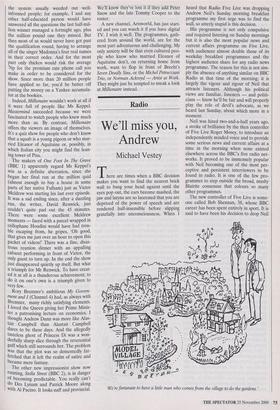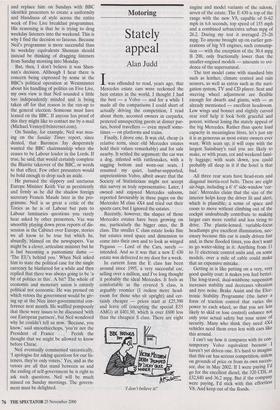Radio
We'll miss you, Andrew
Michael Vestey
There are times when a BBC decision makes you want to find the nearest brick wall to bang your head against until the eyes pop out, the ears become mashed, the jaw and larynx are so lacerated that you are deprived of the power of speech and are rendered half-insensible before slipping gratefully into unconsciousness. When I heard that Radio Five Live was dropping Andrew Neil's Sunday morning breakfast programme my first urge was to find the wall, so utterly stupid is this decision.
His programme is not only compulsive and required listening on Sunday mornings but it is also the most popular news and current affairs programme on Five Live, with audiences almost double those of its weekday breakfast programmes and the highest audience share for any radio news programme. The reason for this is not sim- ply the absence of anything similar on BBC Radio at that time of the morning; it is largely the vigour and rigour of Neil that attracts listeners. Although his political views are familiar, listeners — and politi- cians — know he'll be fair and will properly play the role of devil's advocate, as we heard last Sunday, about which more in a moment.
Neil was hired two-and-a-half years ago, a stroke of brilliance by the then controller of Five Live Roger Mosey, to introduce an independently minded voice and to provide some serious news and current affairs at a time in the morning when none existed elsewhere across the BBC's five radio net- works. It proved to be immensely popular with Neil becoming one of the most per- ceptive and persistent interviewers to be found in radio. It is one of the few pro- grammes to step outside the broad, mushy Blairite consensus that colours so many other programmes.
The new controller of Five Live is some- one called Bob Shennan, 38, whose BBC career has been spent entirely in sport. It is said to have been his decision to drop Neil `We're fortunate to have a little man who comes from the village to do the gardens.' and replace him on Sundays with BBC identikit presenters to create a uniformity and blandness of style across the entire week of Five Live breakfast programmes. His reasoning is that he is trying to drag weekday listeners into the weekend. This is why I find the decision so fatuous. Because Neil's programme is more successful than its weekday equivalents Shennan should instead be thinking of dragging listeners from Sunday morning into Monday.
But, then, I don't believe it was Shen- nan's decision. Although I hear there is concern being expressed by some at the BBC's political operation at Westminster about his handling of politics on Five Live, my own view is that Neil sounded a little too independently minded and is being taken off for that reason in the run-up to the general election. Someone must have leaned on the BBC. If anyone has proof of this they might like to contact me by e-mail (Michael.Vestey@btinternet.com).
On Sunday, for example, Neil was mus- ing on the Sunday Times report, since denied, that Baroness Jay desperately wanted the BBC chairmanship when she ceases to be Labour leader in the Lords. If true, he said, that would certainly complete the Blairite takeover of the BBC, or words to that effect. Few other presenters would be bold enough to drop such an aside.
He pursued the slippery and unctuous Europe Minister Keith Vaz as persistently and firmly as he did the shadow foreign secretary Francis Maude later in the pro- gramme. Neil is as great a critic of the Tories as he is of Labour but puts to Labour luminaries questions you rarely hear asked by other presenters. Vaz was smoothly playing down press reports of dis- sension in the Cabinet over Europe, stories we all know to be true but which he, absurdly, blamed on the newspapers. Vaz might be a clever, articulate minister but he is fast becoming a pantomime dame 'The EU's behind you.' When Neil asked him to state the political case for the single currency he blathered for a while and then replied that there was always going to be 'a bit of politics in this'. A bit? The whole of economic and monetary union is entirely political not economic. He was pressed on which vetoes the government would be giv- ing up at the Nice inter-governmental con- ference next month. He waffled pompously that these were issues to be discussed 'with our European partners', but Neil wondered why he couldn't tell us now. 'Because, you know,' said smoothiechops, 'you're not the President of France . . . ' Perish the thought that we might be allowed to know before Chirac.
Neil eventually commented sarcastically, `I apologise for asking questions for our lis- teners, they're only voters.' Yes, and as the vetoes are all that stand between us and the ending of self-government he is right to ask such questions. Neil will be much missed on Sunday mornings. The govern- ment must be delighted.






























































































 Previous page
Previous page